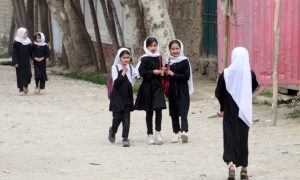UNITED NATIONS: The UN Development Programme (UNDP) emphasized in a newly released report on Friday that the revitalization of Afghanistan’s economy depends on global assistance to enhance productivity and restore women’s rights.
Since the Taliban regained control in August 2021, the socio-economic landscape in Afghanistan has taken a grim turn, as highlighted in the report. Major areas of concern include the erosion of women’s rights and a banking system on the verge of collapse.
Despite a cumulative economic shrinkage of 27 percent since 2020, the Afghan economy is struggling to rebound and seems to be stabilizing at an exceptionally low level of activity. The challenges stem from banking sector restrictions, disruptions in trade, weakened public institutions, and a lack of foreign investment and donor support in critical sectors like agriculture and manufacturing.
In the economic sector, public institutions are losing technical expertise, particularly among women employees, intensifying the crisis. Despite partial progress in areas such as security and opium control, the overall trajectory of the country remains unchanged. The concurrent humanitarian and economic crises, coupled with restrictions on women’s rights, have disproportionately affected the female population. Women face limited access to public spaces, reduced food consumption, and heightened income inequality. The percentage of women working across all sectors has plummeted from 11 percent in 2022 to a mere six percent this year.
The report introduces the Subsistence-Insecurity Index (SII), which employs 17 non-monetary indicators across three dimensions to gauge deprivation. Shockingly, almost 70 percent of Afghans are unable to meet their basic needs for food, healthcare, employment, and other daily necessities, according to the index. International assistance has played a crucial role in Afghanistan, saving millions from starvation, preserving livelihoods, and preventing economic collapse.
However, aid flows are dwindling at a time when the majority of the population remains highly vulnerable, as noted by Stephen Rodriques, UNDP Resident Representative in the country.
“The assistance and efforts require complementary investment to stimulate the recovery of the private sector, financial system, and overall production capacity of the economy,” he said.
highlighted the significance of addressing challenges in the microfinance sector. This sector plays a crucial role in supporting micro and small enterprises led by women, which have witnessed a 60 percent contraction since 2021. The UNDP asserted that prioritizing women’s economic participation is essential in any initiatives aimed at addressing the crises in Afghanistan.
























